Censored scientists?
Grok-assisted digest of a conversation with Robert Kogan (to be updated with additional interaction, as those occur)
Archiving a conversation from X using Grok. Minor formatting and stylistic edits and additions.
Exchange on Censorship: Jessica Hockett and Robert Kogon’s Discussion on X Regarding COVID-19 Scientists and Government Meetings
In a recent thread on X, Jessica Hockett (@Wood_House76) sparked a conversation about censorship during the COVID-19 era by referencing a 2020 post from former U.S. HHS Secretary Alex Azar.
The discussion evolved into an exchange with Robert Kogon (@EdV1694), focusing on the experiences of scientists like those behind the Great Barrington Declaration (GBD), the nature of censorship on social media, and broader implications for free speech.
Below, we [Grok]1 capture the key posts verbatim, presented in chronological order to preserve the flow of the conversation.
The Initial Post
On 2 October 2025, Jessica Hockett posted the following, quoting Alex Azar’s 5 October 2020 tweet about meeting with Dr. Scott Atlas and three infectious disease experts:
Hope we can all agree that meeting with the U.S. HHS secretary is not what would happen to scientists who are truly being censored.
Azar’s quoted post:
“Today I met with Dr. Atlas and three distinguished infectious disease experts to discuss COVID-19 science and data from around the world, as part of our commitment to ensure we hear broad and diverse scientific perspectives.”
“In the conversation with Martin Kulldorff, PhD (Harvard), Jay Bhattacharya, MD, PhD (Stanford), and Sunetra Gupta, PhD (Oxford), we heard strong reinforcement of the Trump Administration’s strategy of aggressively protecting the vulnerable while opening schools and the workplace.”
Kogon response:
Robert Kogon responded on 3 October 2025, with a three-part thread addressing Hockett’s point directly. His replies built on each other, discussing the timing and extent of any censorship faced by the scientists involved:
Not then, no, and certainly not by the Trump admin — which wouldn’t have had any power to censor them anyway. But later a little bit: Jay anyway. But, even then, as you know, it was very minor compared to literally 1000s of others.
Jay was placed on a ‘trends blacklist’ (that’s the official term in the algo), which, afaik, merely meant that his post wouldn’t be publicized as trending in the right column, not that they wouldn’t be allowed to trend.
This was probably the most minor form of shadowbanning back then. But the owner of this platform [Elon Musk], for his own reasons, chose to turn Jay into the poster boy for ‘govt censorship’ in the ‘Twitter Files’.”
Hockett response:
Hockett engaged with Kogon’s thread, first on 3 October 2025, and then more extensively on 13 October 2025. Her responses elaborated on timelines, the nature of censorship, and philosophical views on free speech:
First reply, 3 October 2025, responding to Kogon’s post, accompanied by an image:
I’ll come back to this thread later, but regarding Twitter/ X, Jay wasn’t on the platform til August 2021. Also, FYI, it is my understanding that BEFORE March 2020, Jay Bhattacharya was ALREADY tapped/notified of the possibility of federal appointment. If that’s true, which I believe it is, it changes some things.
Second Hockett reply, 13 October 2025, building on her previous post and directly addressing Kogon:
I’m back, as promised. :)
[Jay Bhattacharya’s] ‘trend blacklist’ hit the same day as his account was launched. From a 2025 ‘don’t both sides benefit?’ perspective, it’s fair to question the timing and co-incidence of those simultaneous events.
We agree that The Twitter Files were a sham, but I think you pin it on Musk’s kowtowing to the EU...whereas I see wider 2020+ social media orchestration and view the first six months of 2020 (certainly March through May) as the MOST censored in terms of actual silencing and protection of the Op/Counter Op launch. I can present a rationale for that another time...
We agree ‘trend blacklist’ was barely censorship.
In a late 2021 email sent from the GBD3 to signers (see Wood House 76 Stack today), the trio said they didn’t feel silenced...which is good, because they weren’t!
Interestingly, they also recognized their own “censorship” was minimal.
You might argue perception didn’t matter; however, Kulldorff was removed for a month in May 2021, so it’s still notable that they KNEW they were experiencing relatively less censorship than others were.
As you know, by the end of 2021, other people had already been removed from the platform altogether, and the overt COVID-19 misinformation labeling was in effect.
The implicit position of Jay and many other COVID dissidents TO THIS DAY is that it’s somehow “worse” when a big-name (even a lesser-known) scientist is censored by a platform, be it government-directed or otherwise.
I can’t agree with that. In fact, I could argue that the worst possible scenario would be Scientists being elevated and the rest of us being censored/silenced.
The right to free speech and free press are 1A [First Amendment] rights for each person. Scientists don’t get more or ‘better’ rights.
FYI, I can’t reply to your tweet below at all because I’m blocked by Jay Bhattacharya.
It didn’t used to work that way; you used to be able to reply in the thread to others. https://t.co/v2oMTtlMbj
However, to be honest, I’m fine with that, as someone who believes that no one has the right to be heard by an individual.
Because Twitter was conceived as a mirco-blog, that is what I believe it still is: No different from a ‘regular’ blog.3
When I press “post,” I am publishing on a “press.” If individuals want to turn off replies or select who can reply (via the mechanism offered) - or block an account - I think that’s fine. The exceptions are public officials and some organizations.
I appreciate the conversation. It bothers me far less than it does you, I think, that no one is reading it, because I would rather it occur here, in public, than in private.
Context and Implications
JAH: Reminder that AI tools lean toward flattering the user; Grok is no exception.
This exchange highlights ongoing debates within COVID-19 skeptic communities about the role of government, social media platforms, and scientists in shaping public discourse.
Hockett emphasizes that true censorship wouldn’t align with high-level government access, while Kogon contextualizes minor platform restrictions faced by figures like Jay Bhattacharya (one of the Great Barrington Declaration authors).
The discussion touches on broader themes, including “The Twitter Files,” EU [European Union] influences, and the prioritization of scientists’ voices over everyday individuals.
Notably, a separate reply from @Medical_Nemesis (“Matters of dying and living are not scientific to begin with. Why would a government bureaucrat who imagines himself to be a scientist know how you should die, suffer, and live as a person who belongs to a community of people? These people don’t know that you even live.”) was not part of the direct Hockett-Kogon dialogue.
As of 13 October 2025, the thread remains active but shows limited engagement, underscoring Hockett’s point about public visibility versus private conversations.
I appreciate this public conversation with
, whose thinking and work I admire, even when/where I see things differently. When he responds, I will either update this post or create a second installment. Mine is hardly the last word!Related:
Articles connected to The Great Barrington Declaration
“Peter McCullough Is a Pandemicist AND an Example of What the Dual-Sided Government Operation Wanted Americans to Hear in 2020” (23 March 2024)
Not included in X exchange, added here.
Not cited in X exchange, added here. https://en.wikipedia.org/wiki/Microblogging | https://biz.libretexts.org/Bookshelves/Marketing/Introduction_to_Social_Media_(Brixey)/02%3A_Social_Media_Collaboration_and_Online_Platforms/2.08%3A_Twitter_and_the_Rise_of_Microblogging | https://www.researchgate.net/publication/254762085_Tracing_Twitter_-_The_Rise_of_a_Microblogging_Platform


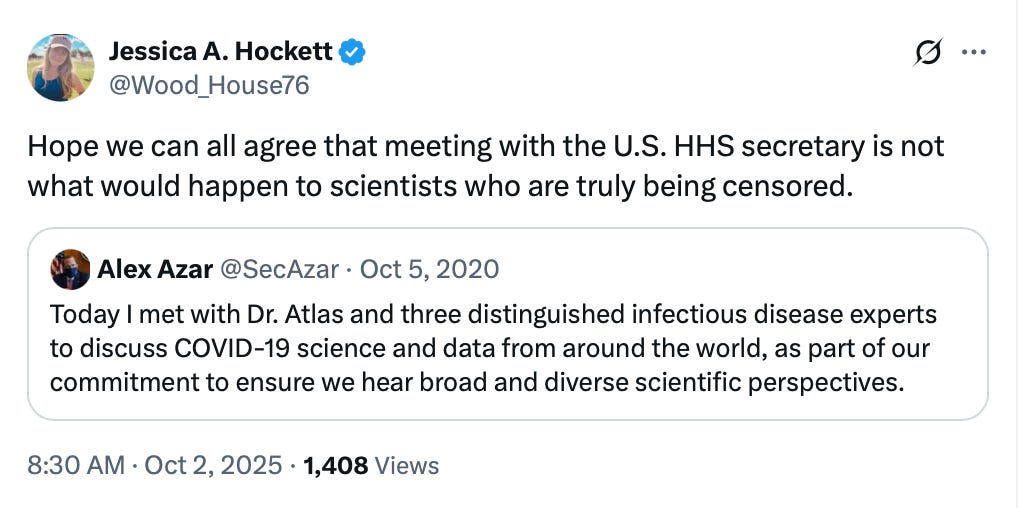
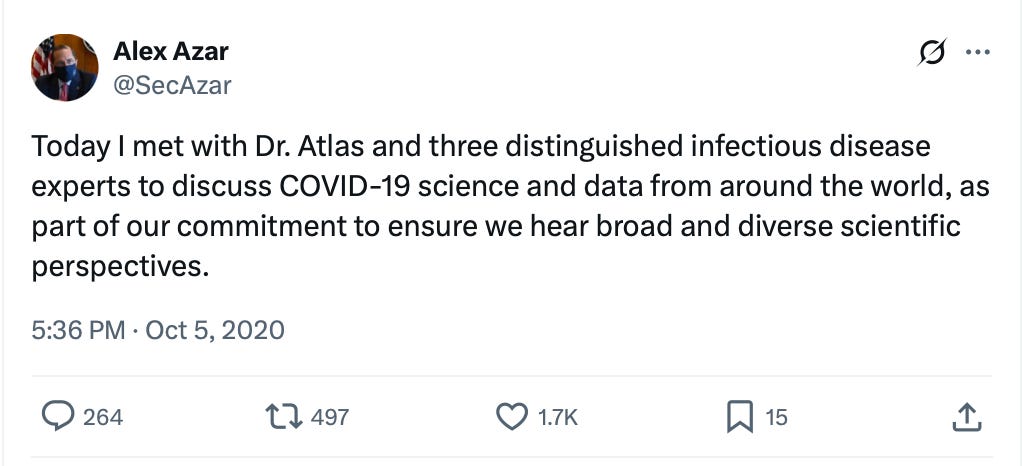
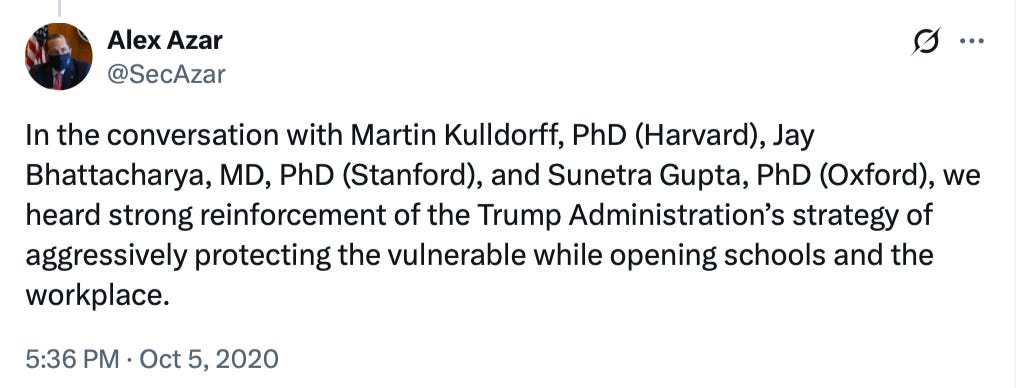
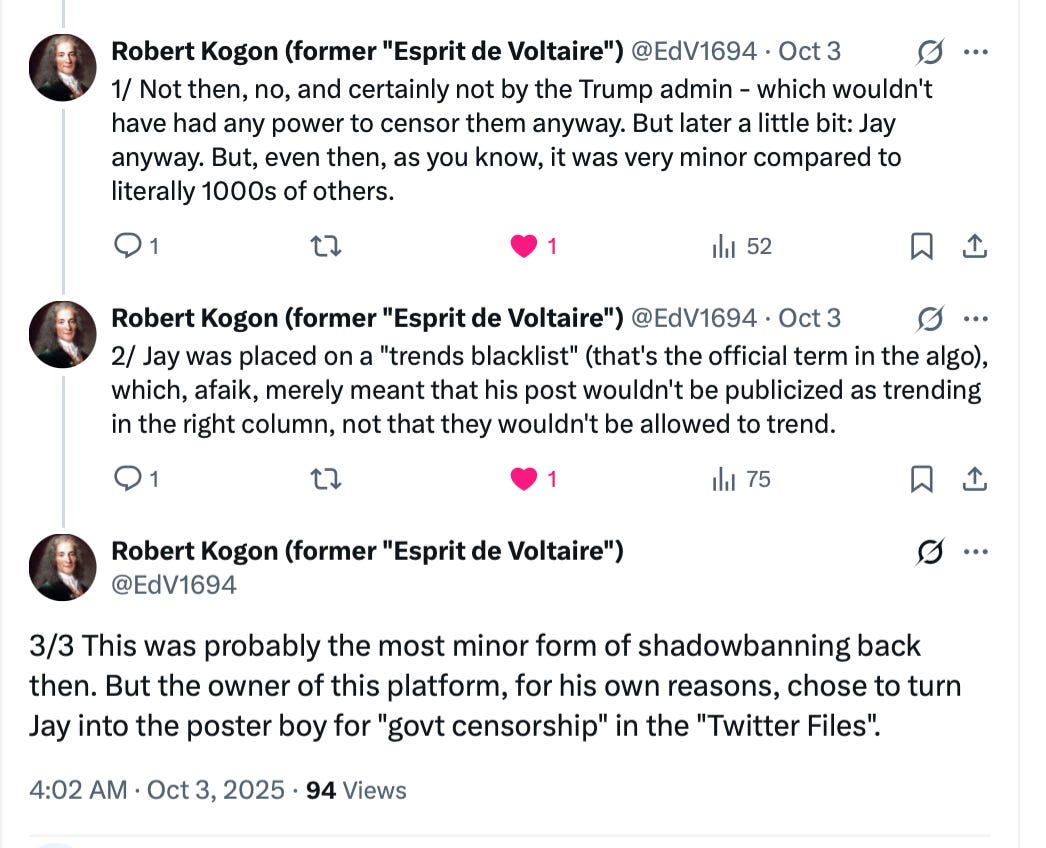
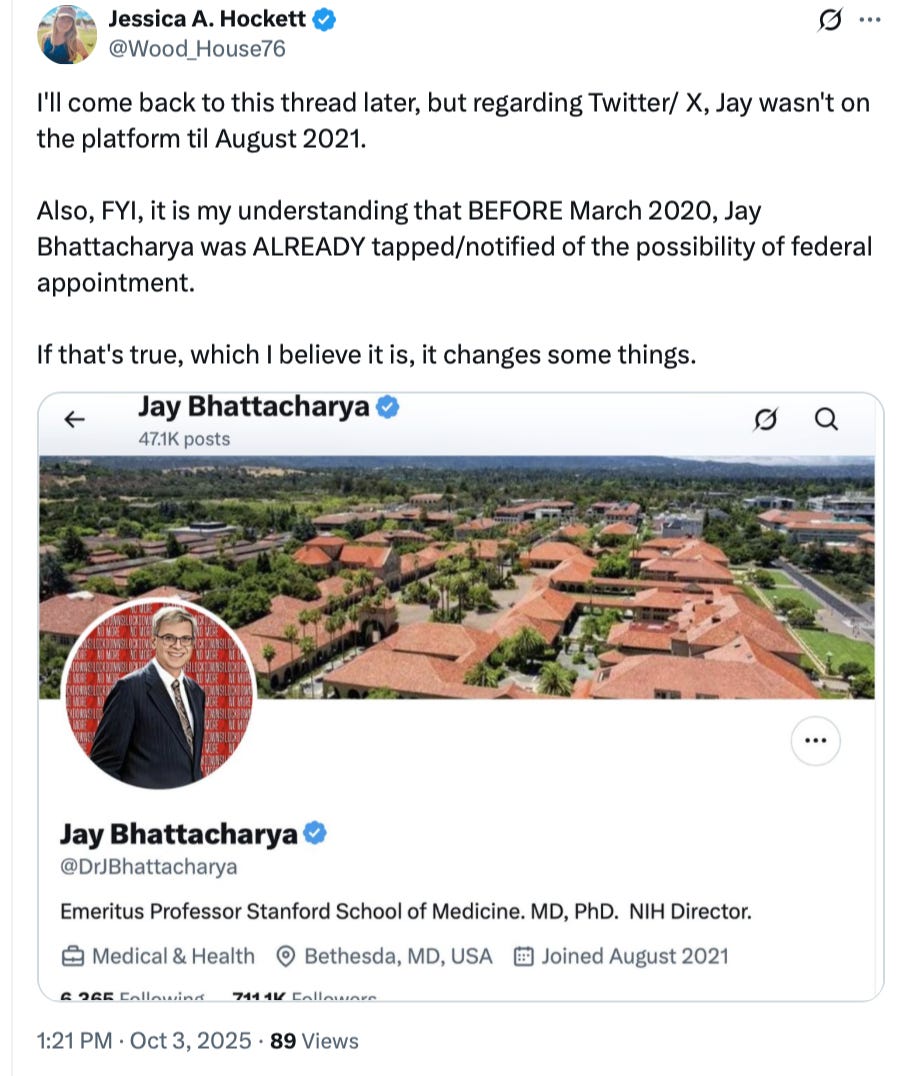
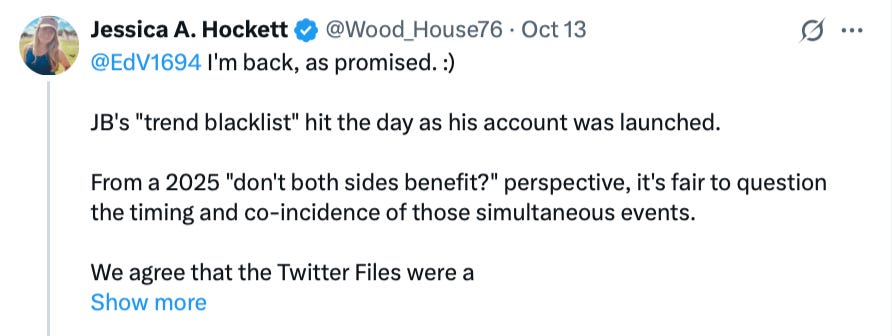
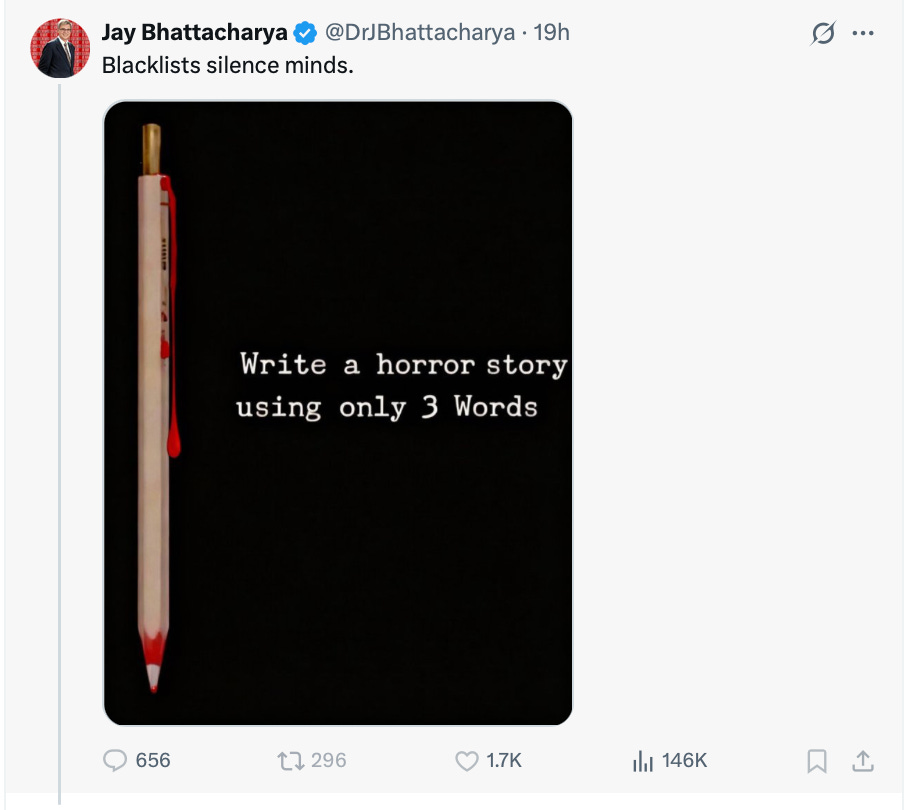
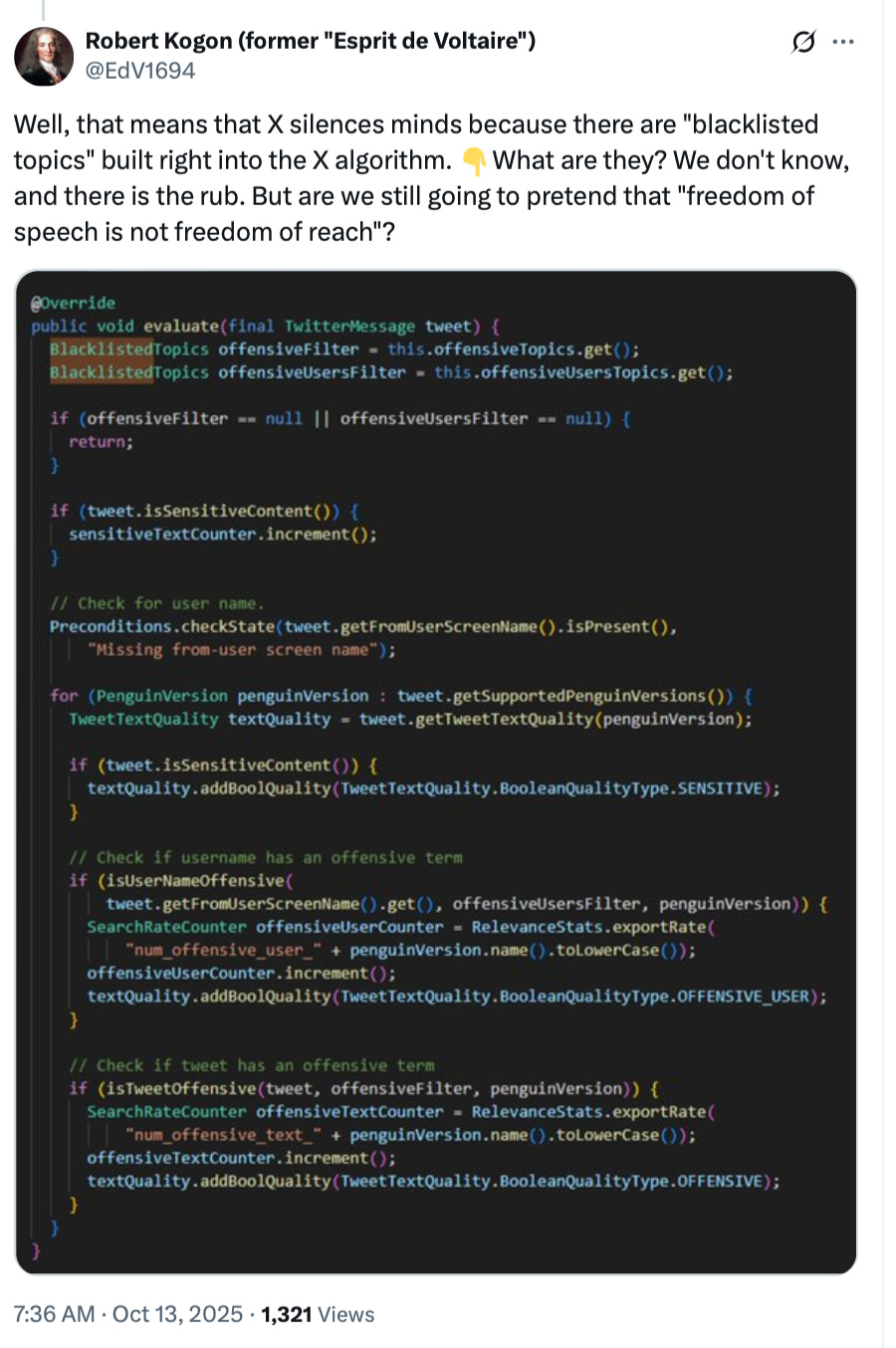
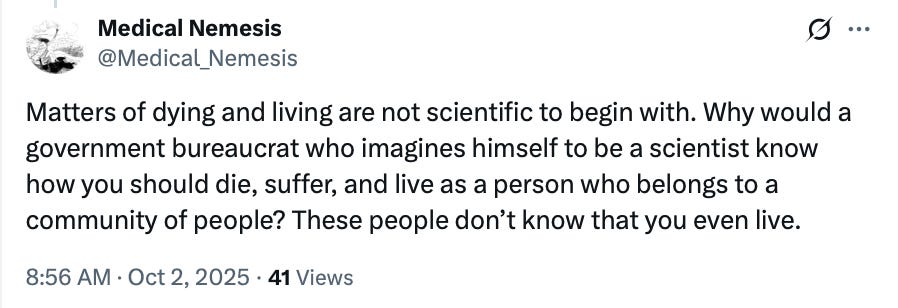
You put up a great challenge to the narrative!
I'm glad you pointed out that the Twitter files was a sham.
The Twitter files was so annoying to go through!
There was no evidence source data and it got people to accept screenshots as proof.